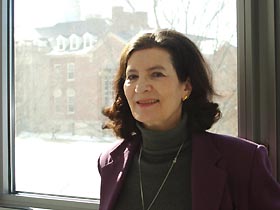|
This is an archived article.
For the latest news, go to the Advance
Homepage
For more archives, go to the Advance Archive/Search Page. |
||
|
Gilbert Breaking New Ground
In Philosophy Of Social Phenomena By Elizabeth Omara-Otunnu
"It would be fantastic if someone could come to me and say 'You're totally wrong'," she says. "It would be bittersweet, but it would be amazing. One is always trying to demolish things oneself."
A professor of philosophy, Gilbert describes her scholarly career as an "attempt to understand the structure of ideas that have importance in everyday life." The particular concepts that intrigue her have to do with social phenomena. Because her life's work consists in the articulation of ideas and logical arguments, an important part of that process is to test her theories, both through internal dialogue with imaginary objectors and by presenting her work to other philosophers for debate. "I spend a lot of time thinking about the subject and trying to develop clear arguments for the position I'm putting forward," she says. "I also try to look at that position in a very critical way, to think what objections might be raised to it and how I could reply." Winning Formula
Gilbert, who grew up in England, earned the rare distinction of a "double first" in classics and philosophy as an undergraduate at Cambridge University, and a doctorate in philosophy from Oxford. As a graduate student, she became interested in character traits and later wrote an article, sparked by an argument posed by French philosopher Jean-Paul Sartre, about whether it is possible to view oneself as evil. She then moved into the area of social philosophy, raising questions about the nature of society and related phenomena such as social rules and group beliefs. Her dissertation, "On Social Facts", a title coined in reference to the late 19th-century French sociologist and philosopher Emile Durkheim, later evolved into her first book, a more than 500-page treatise published in 1989 under the same name. The book was hailed by her publisher, Princeton University Press, as a "highly original" work. It helped found a new field, the philosophy of social phenomena, part of a broader approach known as analytical philosophy. She has since published two other books in the same field. Gilbert began her teaching career at Manchester University, England, before joining the faculty at UConn in 1983. Her work has been translated into French, Italian, and Chinese, and a new collection of her essays will soon be published by Presses Universitaires de France in a new series on philosophy and the social sciences. Joint Commitment
To illustrate the concept, Gilbert uses an example from everyday life: Imagine two people walking alongside each other, when one suddenly heads off in another direction. If the two are strangers, it's not an issue, but if they were walking together, the other may feel aggrieved and call for an explanation, she notes. It seems that each person has authority in relation to the other, by virtue of engaging in collective action. What lies behind this sense of accountability, Gilbert argues, is that the two understand themselves to be jointly committed to their walk, and that this commitment gives each the standing to object if it is violated. Group Dynamic
Her theory, however, suggests a group dynamic: "People behave not always in terms of their own preferences and personal goals, but in light of goals they accept together," she says. In a university department, for example, during a meeting to discuss in which field the department needs a new faculty member, the current faculty might begin by being equally divided between fields A and B, but the sense that emerges from the meeting is that B is what is needed. "Once that's established, it becomes 'what the department wants', and what individuals want becomes irrelevant," says Gilbert. "Unless someone does something about it, it will affect everyone's behavior. We end up mouthing a set of views that are the views of the group, and it's not easy to say the opposite." Reconsidering Rights
"If people are jointly committed, they have obligations toward one another and rights against one another," she says. Another part of her work relates to the notion of collective responsibility. "Collective guilt is a hot topic because of what's going on in world," she notes. "People are puzzled about the horrors that confront them. They wonder who to blame, how to deal with it, and how to make the world more peaceful. "People tend to commit atrocities in a group - a battalion, for example. Collective action is involved. We feel that what happens has to happen through individuals, but people can be in the grip of collective beliefs and emotions like hatred, and these can be very powerful forces in creating atrocities," she says. "The question of whether a group can feel remorse and what that would amount to is quite important in practical terms," adds Gilbert, who has been invited to speak at conferences about war crimes and crimes against humanity. "If groups acknowledge their guilt, we may get more collective forgiveness and intergroup reconciliation. That part of human life needs to be looked at." |
 here can't be many
academics who would welcome a successful debunking of their
theories. But that attitude is part and parcel of Margaret
Gilbert's rigorous intellectual approach to her work.
here can't be many
academics who would welcome a successful debunking of their
theories. But that attitude is part and parcel of Margaret
Gilbert's rigorous intellectual approach to her work.
